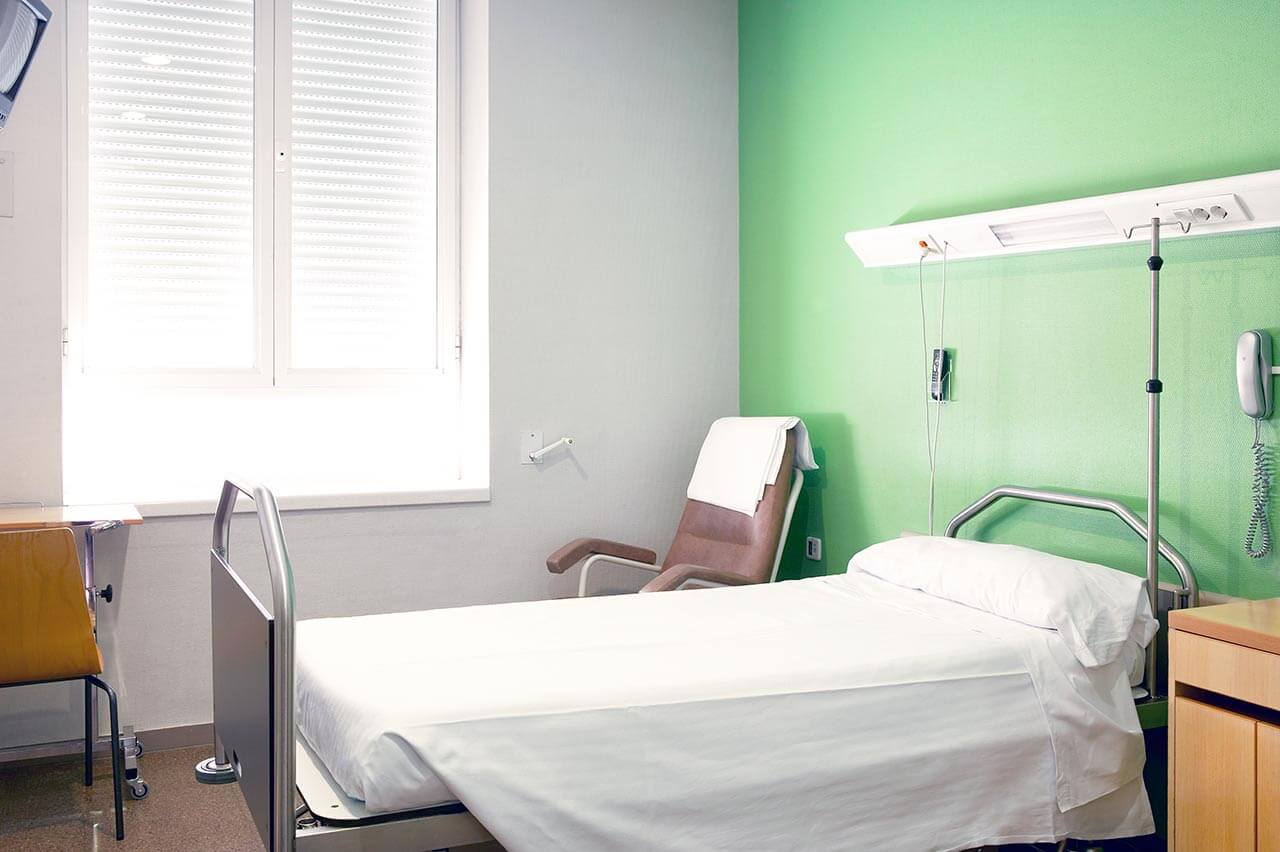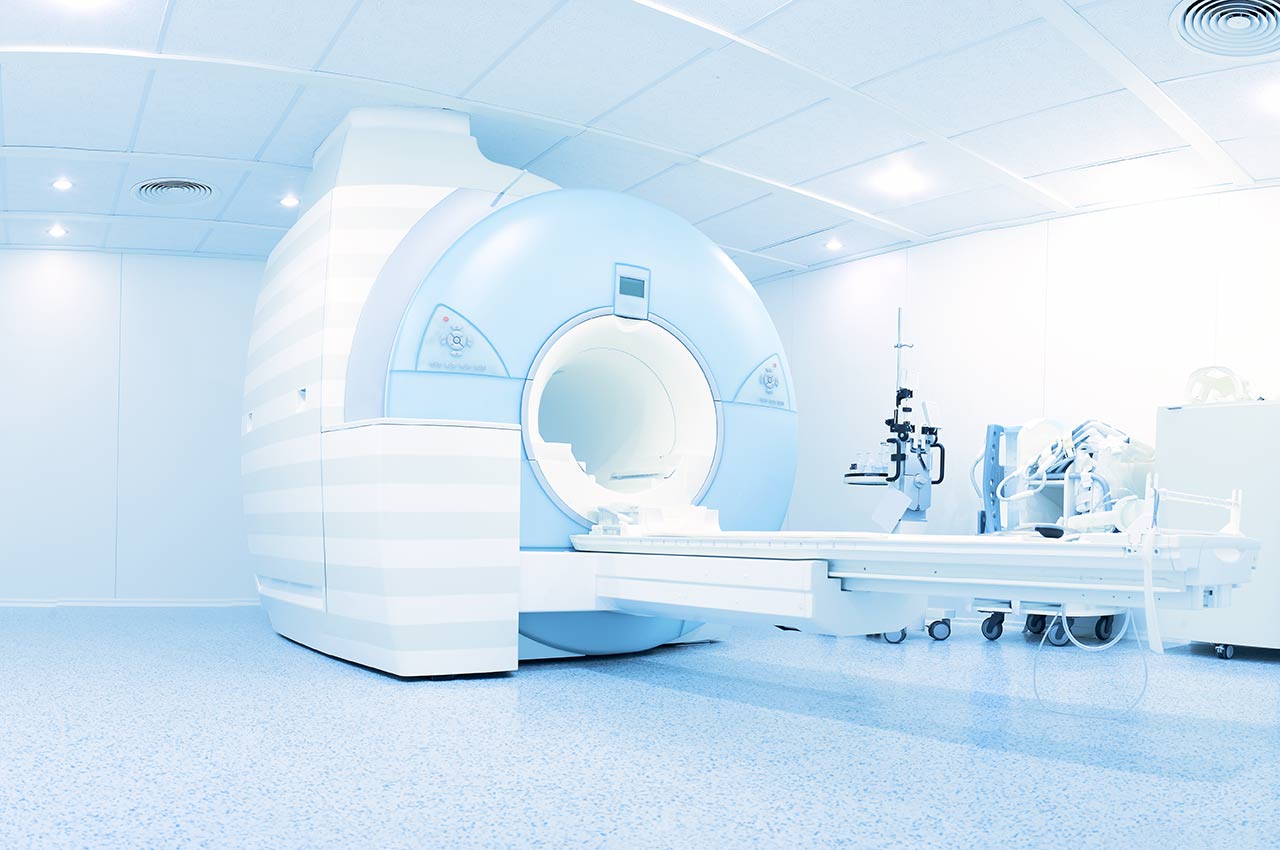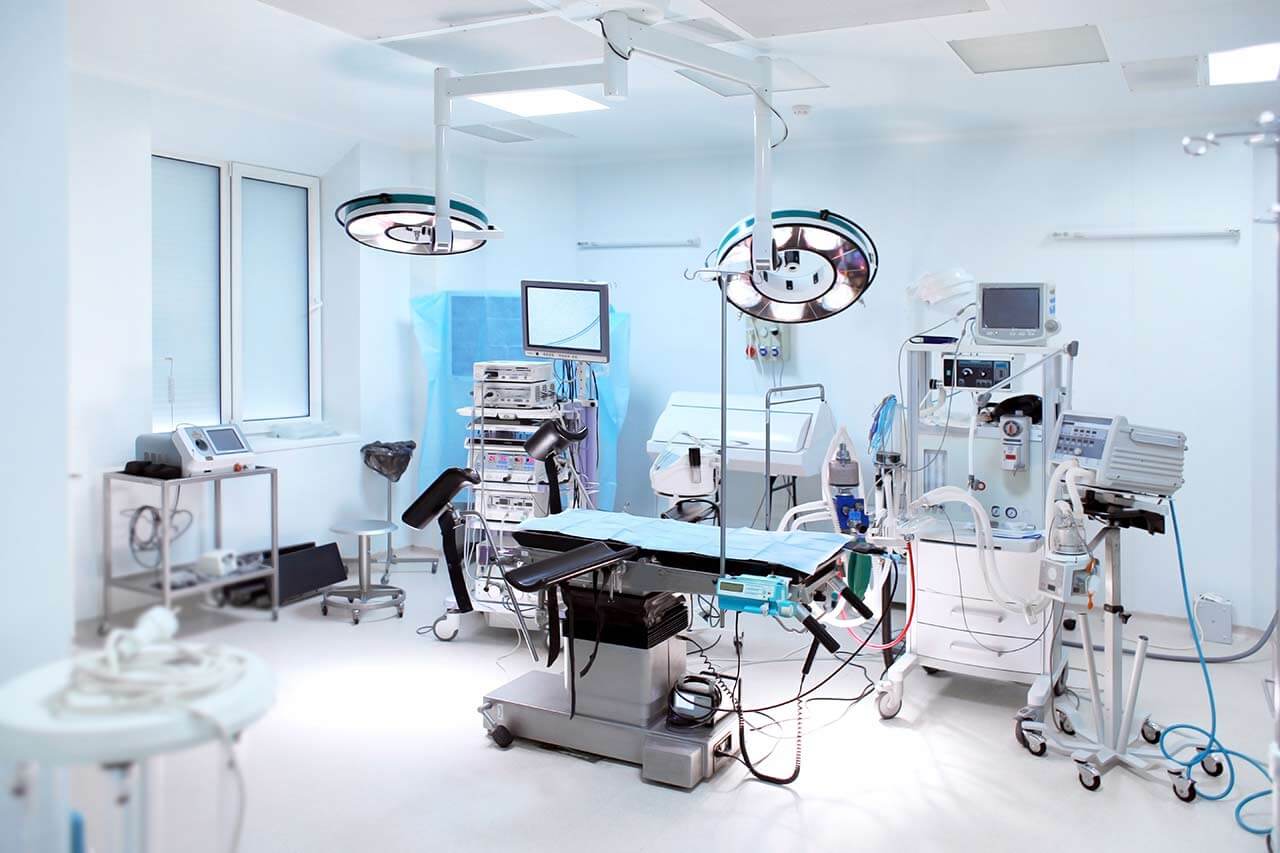
The program includes:
- Initial presentation in the clinic
- clinical history taking
- review of medical records
- physical examination
- laboratory tests:
- complete blood count
- general urine analysis
- biochemical analysis of blood
- TSH-basal, fT3, fT4
- tumor markers
- inflammation indicators (CRP, ESR)
- indicators of blood coagulation
- abdominal ultrasound scan
- CT scan/MRI or PET-CT of abdomen
- preoperative care
- cytoreductive surgery to remove visible tumors
inside the abdomen and HIPEC - histological and immunohistochemical
examination of removed tissues - symptomatic treatment
- cost of essential medicines
- nursing services
- stay in the hospital with a full board
- accommodation in a 2-bedroom ward
- elaboration of further recommendations
How program is carried out
During the first visit, the physician will conduct a clinical examination and go through the results of the available diagnostic tests. After that, you will undergo the necessary additional examination, such as the assessment of liver and kidney function, ultrasound scan and tomography of the abdominal organs. Based on the results of the examination, the physician will choose the surgical technique and the type of anesthesia. After that, preparation according to the preoperative standard will start.
Cytoreductive surgery begins with general anesthesia. The intervention is performed as open surgery, i.e. through the incision in the anterior abdominal wall, so that the surgeon can carefully examine the peritoneum and the surface of the abdominal organs. The surgeon removes affected by the malignant process ovaries, areas of the peritoneum and metastases in other internal organs. This stage of the operation can take several hours, since the overall effectiveness of the treatment depends on the completeness of the malignant tissues removal.
At the next stage of the operation, the surgeon inserts several catheters into the abdominal cavity. Through the catheters, a heated solution of a chemotherapy drug is pumped inside. The special system maintains the required temperature (42-43 degrees Celsius), pressure and circulation rate of the medicinal solution. The solution mechanically flushes out blood clots and remnants of malignant tissues, and a heated chemotherapy drug destroys micrometastases in internal organs and lymph nodes (micrometastases can’t be detected by the naked eye).
After 1-1.5 hours, the chemotherapy drug is removed from the abdominal cavity and the abdominal cavity is washed with saline. After that, the surgeon removes the catheters and sutures the incision of the anterior abdominal wall.
After the completion of the operation, you will be transferred to the ward of the intensive care unit, under the round-the-clock supervision of doctors and nurses. In 1-3 days after the operation, your drains will be removed and you will be transferred to a regular ward for further recovery. The whole treatment takes 10-12 days on average.
Finally, the attending physician will evaluate the results of control examinations, schedule the date of discharge from the hospital and give you detailed recommendations for further follow-up and treatment.
Required documents
- Medical records
- MRI/CT scan (not older than 3 months)
- Biopsy results (if available)
Service
You may also book:
 BookingHealth Price from:
BookingHealth Price from:
About the department
The Department of Adult and Pediatric Gynecology, Mammology and Obstetrics at the University Hospital Würzburg offers the diagnostics and treatment of all gynecological diseases. The department specializes in the treatment of breast cancer and cancer of the female reproductive organs. All traditional and modern conservative and surgical methods are used for this purpose. The department also provides reliable and individual obstetric services at the Center for Mother and Child and offers all methods of prenatal diagnostics. The department is headed by Prof. Dr. med. Achim Wöckel.
The department is a recognized center for the treatment of cancer and other breast diseases in women. All methods of surgical and conservative treatment are offered within the certified Breast Center. The Breast Center is part of the Comprehensive Cancer Center Mainfranken, thanks to which the department provides the diagnostics and therapy at the highest scientific level. The department offers a comprehensive treatment, ranging from mammography to postoperative breast reconstruction, radiation therapy and the appointment of chemotherapeutic drugs.
Another important focus is the operative gynecology and gynecologic oncology. It offers treatment of all types of gynecologic tumors. If indicated, the surgical treatment will be performed. The combination of minimally invasive and classical surgical methods allows the doctor to perform sparing surgery, which contributes to the rapid return of the patient to everyday life. In some clinical cases, the department cooperates with the specialists in the field of surgery and urology.
Also the patients with infertility receive a competent assistance in the department. It has a specialized center for the treatment of infertility, gynecological endocrinology and reproductive medicine. All methods are offered for the treatment of infertility, including in vitro fertilization. Infertility is often associated with hormonal disorders, so there is active cooperation with the Department of Endocrinology.
The service range of the department includes the diagnostics and treatment of the following diseases:
- Diagnostics and treatment of benign and malignant diseases of the mammary gland in women (Breast Center)
- Diagnostics, treatment, and prevention of familial breast and ovarian cancer (Familial Breast and Ovarian Cancer Center)
- Diagnostics and treatment of all types of genital cancer
- Ovarian cancer
- Uterine cancer
- Cervical cancer
- Vaginal cancer, etc.
- Diagnostics and treatment of endometriosis
- Minimally invasive endometriosis surgery (Endometriosis Center)
- Urogynecology, diagnostics and treatment of pelvic floor diseases
- Urinary incontinence
- Pelvic organ prolapse
- Pediatric gynecology
- Center for Mother and Child
- Fertility Center / Reproductive Medicine and Gynecological Endocrinology Center (ZERM)
- Primary infertility
- Secondary infertility
- Pregnancy planning in cancers
- Recurrent miscarriage
- Hormonal disorders
- And other gynecological diseases and pathologies
Curriculum vitae
Training and Professional Experience
- 1995 - 1998 Preclinical Study of Medicine at the Martin Luther University of Halle-Wittenberg.
- 1998 - 2002 Study of Medicine (with practice) at the Free University of Berlin.
- 11/2002 Graduation from the Medical School and passing of the 3rd State Examination.
- 03/2003 Degree of the Candidate of Medical Sciences at the Charite University Hospital Berlin (magna cum laude).
- 01/2003 - 12/2003 Postdoctoral Fellow / Research Fellow at the Institute of Anatomy at the Charite University Hospital Berlin.
- 01/2004 - 09/2005 Intern and Assistant Physician in the Department of Gynecology and Obstetrics at the Vivantes Humboldt Hospital Berlin, Charite University Hospital.
- 10/2005 - 12/2006 Assistant Physician in the Department of Gynecology and Obstetrics at the St. Joseph's Hospital in Berlin, Charite University Hospital.
- 01/2007 - 10/2007 Research Fellow and Project Coordinator at the Center for Quality in Medicine, Berlin (a joint institution of the Federal Medical Chamber and the Federal Association of Sickness Fund Doctors).
- 10/2007 - 03/2010 Assistant Physician at the University Hospital Ulm (rotation in the Departments of Obstetrics, Ultrasound Diagnostics, Surgery, Oncology).
- 03/2010 Certified Medical Specialist in Gynecology and Obstetrics of the Federal Medical Chamber of Baden-Württemberg.
- 09/2010 Appointment to the position of the Senior Physician in Operative Gynecology at the University Hospital Ulm.
- 10/2010 - 07/2011 Leading Senior Physician in Gynecology at the University Hospital Ulm.
- 07/2012 - 10/2012 Temporary Acting Medical Director in the Department of Gynecology at the University Hospital Ulm.
- 10/2012 - 03/2014 Leading Senior Physician in the Department of Gynecology at the University Hospital Ulm, Head of the Interdisciplinary Breast Centre, Responsible for Healthcare Quality Management.
- 02/2013 Visiting Professor at the Medical Faculty, University of Ulm.
- 01/2014 Invitation to the position of (W3) Professor in Obstetrics and Gynecology at the Johannes Gutenberg University Mainz with the position of the Institutional Medical Director.
- 01/2014 Invitation to the position of (W3) Professor in Obstetrics and Gynecology at the Julius Maximilian University of Würzburg with the position of the Head of the Department.
- Since 05/2014, Chief Physician of the Department of Adult and Pediatric Gynecology, Mammology and Obstetrics at the University Hospital Würzburg.
Photo of the doctor: (c) Universitätsklinikum Würzburg
About hospital
According to the FOCUS magazine in 2019, the University Hospital Würzburg ranks among the top national German hospitals!
The hospital is one of the oldest medical facilities in Germany. The centuries-old traditions of first-class treatment are combined with the very latest achievements of modern evidence-based medicine and advanced expert experience. The hospital is the maximum care medical center and covers all fields of modern medicine. The hospital has an impeccable international reputation and treats a large number of patients from other countries every year.
A distinctive peculiarity of the hospital is active interdisciplinary cooperation. A large number of diseases are diagnosed and treated within the specialized centers, which medical teams rely on the unique experience of treatment of a wide variety of clinical cases. For example, such centers include the General Cancer Center, the Stem Cell Therapy Center, the Breast Health Center, the Gastrointestinal Center, the Thoracic Surgery Center, etc. In total, the hospital has more than 40 centers of this kind. Therefore, the patients of the hospital are confident that they will be offered the most relevant treatment in accordance with the very latest medical recommendations.
In addition to the most advanced achievements and methods of modern medicine, the medical team of the hospital makes every effort to create a comfortable, friendly atmosphere, which promotes patient well-being and recovery.
Photo: (с) depositphotos
Accommodation in hospital
Patients rooms
The patients of the University Hospital Würzburg live in comfortable rooms made in a modern design and bright colors. The patient room includes a bed with a remote control, a bedside table with a sliding table, a wardrobe, a TV. The patient rooms have the possibility of Internet connection. The enhanced-comfort rooms are equipped with a safe, a fridge and upholstered furniture.
Meals and Menus
The patients of the hospital are offered a varied and tasty three meals a day. There is a daily choice of several menus, including a dietary one. In case of intolerance to any food, please inform the medical staff about your food preferences in advance. After that, you will be offered an individual menu. Also, the hospital houses the cafes and cafeterias with a wide assortment of drinks, fresh pastries, fresh salads, sweets and other dishes.
Further details
Standard rooms include:
Religion
Christian priests are available for the patients at any time. Representatives of other religions may be requested at any time.
Accompanying person
Your companion may stay with you in your room or at a hotel of your choice during the fixed program.
Hotel
You may stay at the clinic hotel or a hotel of your choice during the outpatient program. Our manager will help you choose the best option.





